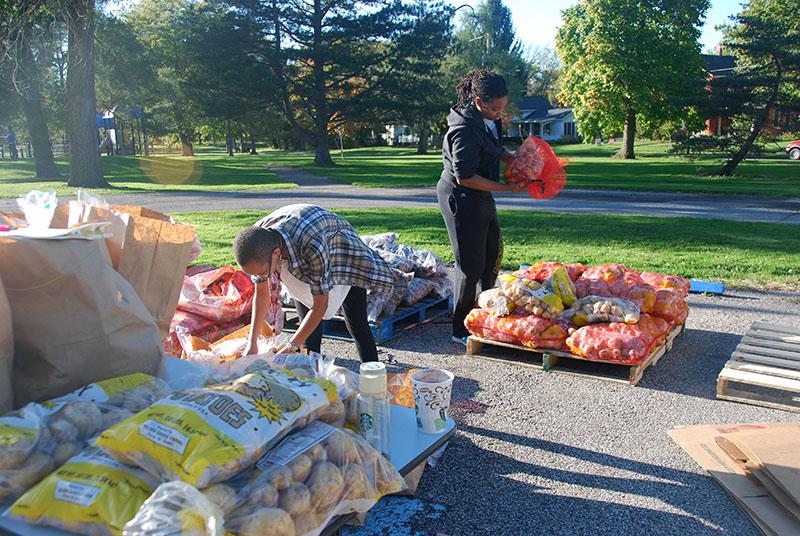Local Restaurants Host OCS Fundraiser
College first-year Brandi Metzger, an Oberlin Community Services social justice intern, and volunteer Alexandria Zimmerman handle produce for the OCS farmers market. This coming week, members of OCS are hosting the first-ever “Restaurant Week,” where local restaurants will donate a portion of their profits to support OCS’s efforts to fight food insecurity in Ohio.
October 10, 2014
Oberlin Community Services will be partnering with WOBC next week to host Oberlin’s first-ever Restaurant Week. This event will be a fundraiser for OCS to help the organization keep up with increasing demand for its services, which include programs such as food distribution and mentoring in support of those without financial resources.
Five local businesses and organizations will be participating: The Feve, Slow Train Cafe, Lorenzo’s Pizzeria, Burgermeister food truck and the Rotary Club.
Slow Train co-owner Jessa New, OC ’01, said that although the coffee shop has hosted fundraisers for the Zion Community Development Corporation and Providing Oberlin With Efficiency Responsibly, it has never worked directly with OCS.
“It’s nice that we have an opportunity to work with another group that’s looking to make an impact in Oberlin,” said New.
Restaurant Week will kick off this Sunday with an event at The Feve. Throughout the following week, the five participating businesses will host fundraiser events including the dog-friendly “Paws on the Patio” at Lorenzo’s Pizzeria and a Paris-themed auction at the Rotary Club.
During the week, WOBC will be airing audio pieces that provide community perspectives, including interviews with staff members from OCS, as well as restaurants and student groups.
The idea for Restaurant Week originated in a conversation between OCS volunteer and community liaison Margaret Swendseid and WOBC staffer and College senior Sophie Hess. Although the discussion started as a pitch for a radio segment that was ultimately never produced, Hess said the conversation was fruitful in other ways.
“We were talking about how some cities do restaurant weeks, and then the idea came about that it could actually be a really useful and innovative way to fundraise for OCS,” said Hess.
Currently, food distribution makes up the core of OCS’s work, and the organization is struggling to keep up with increasing demand, given its limited budget.
“If you don’t have food, if you can’t feed your family, it doesn’t matter [what else] you’ve got going on,” said Executive Director of OCS Cindy Andrews.
Restaurant Week is a part of ongoing fundraising efforts to ensure that OCS has enough resources to avoid turning anyone away.
In 2013, OCS provided food to an average of 1,800 clients every month. This year, it is feeding about 1,000 additional people every month, according to Andrews. Although OCS officially services residents of Oberlin, its surrounding towns and southern Lorain County, it accepts anyone who is in need of food.
“If you are from Elyria or Lorain, and you show up for food, we will not turn you away. Likewise, if you’re driving across Interstate 80, and you stop in Oberlin, and you need food, we will provide you with food,” said Andrews.
OCS’s main goal is to increase financial and economic stability in the community. According to Andrews, its primary methods for achieving this are by providing food and mentoring services — which it calls mutual aid — to those who need it in a dignified and accessible way.
Andrews joined OCS as executive director in January of 2014 and has been working since then on OCS’s new strategic plan, titled “Planting Seeds for Sustainability and Growth.” The plan will expand OCS’s offered programs to include financial management classes, GED training through Junior Vocational School and Lorain County Community College and a nursing aide training program.
“Those opportunities allow us to come together as a community and coordinate our services and learn from each other,” said Andrews. “Because we don’t have all of this figured out, we need partners to do this.”
OCS gets most of its food from Second Harvest Food Bank of Northern Ohio, with supplements from the USDA and private donations. Proceeds from fundraisers are often used to purchase food to supplement the food pantry; this way OCS is able to get more food inexpensively compared to the cost of individuals’ food donations.
“We’ve got a challenge feeding our families, and … every dollar that you give me, I can then provide meals for a family of four, because I’m able to leverage that money through [buying food at low prices from] Second Harvest,” said Andrews.
Income from fundraising is also used to improve infrastructure, such as through a plan to increase cold food storage. The OCS food pantry currently has only residential-grade refrigerators and freezers and would like to purchase commercial walk-in refrigerators and freezers, which have a larger capacity and are more energy-efficient.
“If we had more refrigeration, then we could keep produce longer. The amount of produce that we’re asking people to grow [in our community gardens] could be processed in some way and distributed when it’s not garden season,” said Alan Mitchell, food distribution coordinator at OCS. “If you can freeze some peas, corn, peppers and onions, and then use them in a recipe later, it extends capacity.”
Mitchell also emphasized the importance not only of providing food, but also of making sure that food is fresh and healthy.
“We’re trying to increase the amount of fresh produce that people are including in their diets and [make] the healthier choice the easier choice by having it available here in the pantry,” said Mitchell.

























